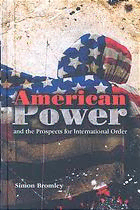
American power and the prospects for international order PDF
Preview American power and the prospects for international order
American Power and the Prospects for International Order AMERICAN POWER AND THE PROSPECTS FOR INTERNATIONAL ORDER SIMON BROMLEY polity Copyright © Simon Bromley 2008 The right of Simon Bromley to be identifi ed as Author of this Work has been asserted in accordance with the UK Copyright, Designs and Patents Act 1988. First published in 2008 by Polity Press Polity Press 65 Bridge Street Cambridge CB2 1UR, UK. Polity Press 350 Main Street Malden, MA 02148, USA All rights reserved. Except for the quotation of short passages for the purpose of criticism and review, no part of this publication may be reproduced, stored in a retrieval system, or transmitted, in any form or by any means, electronic, mechanical, photocopying, recording or otherwise, without the prior permission of the publisher. ISBN-13: 978-0-7456-4238-3 ISBN-13: 978-0-7456-4239-0 (pb) A catalogue record for this book is available from the British Library. Typeset in 10.5 on 12 pt Times NR by SNP Best-set Typesetter Ltd., Hong Kong Printed and bound in Great Britain by MPG Printers Ltd, Bodmin Cornwall The publisher has used its best endeavours to ensure that the URLs for external websites referred to in this book are correct and active at the time of going to press. However, the publisher has no responsibility for the websites and can make no guarantee that a site will remain live or that the content is or will remain appropriate. Every effort has been made to trace all copyright holders, but if any have been inadvertently overlooked the publishers will be pleased to include any necessary credits in any subsequent reprint or edition. For further information on Polity, visit our website: www.polity.co.uk CONTENTS List of Tables and Figures vii Preface viii Introduction: The American Project for a Liberal International Order 1 1 The American Ideology: Modernization Theory and the Neo-Conservatives 8 Introduction 8 What Was Modernization Theory? 10 Containment and ‘Development’ 14 Modernization Theory and World Order 20 Modernity Is Not the ‘End of History’ 31 Modernization Theory, the Neo-Conservatives and the Bush Doctrine 37 Conclusions 50 2 America’s Transatlantic Empire: Where in the World Is America? 52 Introduction 52 The American Empire 54 Imperialism 61 Anarchy, Rivalry and Interdependence 66 US Power and the Liberal Capitalist International Order 82 Conclusions 97 vi Contents 3 American Oil, World Oil: Resources, Confl icts, Control and Scarcity 101 Introduction 101 Reasons for War? 103 America’s Oil, World Oil 106 OPEC and World Oil 115 The United States and Middle East Oil 118 Reshaping the Greater Middle East 122 The Role of Oil in the New Middle East Strategy 135 Carry on Driving? 143 Conclusions 148 4 American Power, the Future of the Dollar and the Challenge of China 149 Introduction 149 International Money 151 From Fixed to Floating Exchange Rates 160 Resurgent Asia 173 Containing China? 185 Conclusions 199 Conclusion: The Prospects for a Liberal International Order 202 Notes 211 Bibliography 226 Name Index 237 Subject Index 240 TABLES AND FIGURES TABLES 3.1 World oil demand changes by region, 2006–8 (thousand b/d) 111 3.2 Top twenty oil companies, by reserves, 2003 139 3.3 Fossil fuel resources, 2000 146 3.4 Comparative costs of (carbon-neutral) electricity generation (cents per kilowatt hour [c/kWh], in $US, 2000) 147 3.5 Projected hydrogen costs ($/GJ in $US, 2000) 148 4.1 International money 156 4.2 US military power in comparative perspective 185 FIGURES 2.1 USA–European Union liberalization 72 3.1 The changing balance of world oil production, 1945–2003 108 3.2 The distribution of world oil reserves by region, 2003 109 3.3 US Department of Energy projected increases in world oil production (Series 1) and world oil production at current rate of expansion (Series 2) 110 3.4 World oil consumption and refi nery capacity and throughput, 2003 112 3.5 Major oil importers and principal suppliers 113 3.6 World oil production, 1997 and 2003 116 3.7 Expansion of proven and declared reserves, 1982–2003 (bn barrels) 138 PREFACE The nature of American power and its place in shaping the interna- tional order is a large and and complex question and I did not exactly set out to write a study of it. This book is, rather, the product of a series of smaller projects that worried away at bits of the puzzle for long enough for me to realize that if I put some of the pieces together a picture might emerge that helps us to see American power and its role in the world in new ways. In retrospect the basic claims of the book seem obvious enough to me, but since they took a while to uncover and because they are suffi ciently different from those found in most other studies of the subject, I hope that their publication contributes to the debates on these questions. For I fi rmly believe that the future relation- ship of the United States to the rest of the world is one of the key ques- tions facing the lives of many people, and that public debate about that role – in the United States and elsewhere – needs not only to be better informed but also to be guided by a genuine understanding of what American power might and might not be capable of achieving. If the present study prompts readers to question some of the assumptions about American power that I explore and to see the pertinence of some of the different questions I ask, it will have served its purpose. Writing a book like this is not easy in the present research- assessment-driven climate – very little of what follows draws on work published in scholarly journals – and it is a tribute to the collegial, relaxed and genuinely open academic culture of the Open University and especially its Faculty of Social Sciences that I have had the space to complete the project. I cannot imagine how I would have written this anywhere else.
